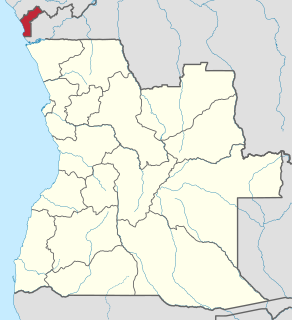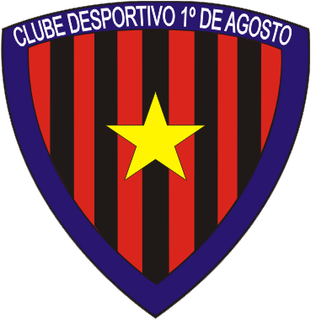
Angola, officially the Republic of Angola, is a country on the west coast of Southern Africa. It is the second-largest Lusophone (Portuguese-speaking) country in both total area and population, and is the seventh-largest country in Africa. It is bordered by Namibia to the south, the Democratic Republic of the Congo to the north, Zambia to the east, and the Atlantic Ocean to the west. Angola has an exclave province, the province of Cabinda, that borders the Republic of the Congo and the Democratic Republic of the Congo. The capital and most populated city is Luanda.
The Angolan Armed Forces or FAA is the military of Angola. The FAA consist of the Angolan Army, the Angolan Navy and the National Air Force of Angola. Reported total manpower in 2021 was about 107,000. The FAA is headed by the Chief of the General Staff António Egídio de Sousa Santos since 2018, who reports to the Minister of National Defense, currently João Ernesto dos Santos.

After independence in 1964 the foreign relations of Zambia were mostly focused on supporting liberation movements in other countries in Southern Africa, such as the African National Congress and SWAPO. During the Cold War Zambia was a member of the Non-Aligned Movement.

Cabinda is an exclave and province of Angola, a status that has been disputed by several political organizations in the territory. The capital city is also called Cabinda, known locally as Tchiowa, Tsiowa or Kiowa. The province is divided into four municipalities—Belize, Buco-Zau, Cabinda and Cacongo.

The People's Movement for the Liberation of Angola, for some years called the People's Movement for the Liberation of Angola – Labour Party, is an Angolan left-wing, social democratic political party. The MPLA fought against the Portuguese army in the Angolan War of Independence from 1961 to 1974, and defeated the National Union for the Total Independence of Angola (UNITA) and the National Liberation Front of Angola (FNLA) in the Angolan Civil War. The party has ruled Angola since the country's independence from Portugal in 1975, being the de facto government throughout the civil war and continuing to rule afterwards.

The president of Angola is both head of state and head of government in Angola. According to the constitution adopted in 2010, the post of prime minister is abolished; executive authority belongs to the president who has also a degree of legislative power, as he can govern by decree.

José Eduardo dos Santos was the president of Angola from 1979 to 2017. As president, dos Santos was also the commander-in-chief of the Angolan Armed Forces (FAA) and president of the People's Movement for the Liberation of Angola (MPLA), the party that has ruled Angola since it won independence in 1975. He was the second-longest-serving president in Africa, surpassed only by Teodoro Obiang Nguema Mbasogo of Equatorial Guinea.

António Agostinho da Silva Neto was an Angolan politician and poet. He served as the first president of Angola from 1975 to 1979, having led the Popular Movement for the Liberation of Angola (MPLA) in the war for independence (1961–1974). Until his death, he led the MPLA in the civil war (1975–2002). Known also for his literary activities, he is considered Angola's preeminent poet. His birthday is celebrated as National Heroes' Day, a public holiday in Angola.

The Front for the Liberation of the Enclave of Cabinda is a guerrilla and political movement fighting for the independence of the Angolan province of Cabinda. Formerly under Portuguese administration, with the independence of Angola from Portugal in 1975, the territory became an exclave province of the newly independent Angola. The FLEC fights the Cabinda War in the region occupied by the former kingdoms of Kakongo, Loango and N'Goyo.

The Angolan War of Independence, called in Angola the Luta Armada de Libertação Nacional, began as an uprising against forced cultivation of cotton, and it became a multi-faction struggle for the control of Portugal's overseas province of Angola among three nationalist movements and a separatist movement. The war ended when a leftist military coup in Lisbon in April 1974 overthrew Portugal's Estado Novo dictatorship, and the new regime immediately stopped all military action in the African colonies, declaring its intention to grant them independence without delay.

The Communist Organization of Angola was a Maoist-oriented communist party in Angola. OCA was founded in 1975 by the Amilcar Cabral Committees. The CAC were founded in 1974 inside the People's Movement for the Liberation of Angola (MPLA) and were excluded from the party in 1975. It opposed the MPLA government and what it called Soviet social-imperialism. It also called for withdrawal of Cuban troops. OCA was suppressed by the government.

The Angolan Civil War was a civil war in Angola, beginning in 1975 and continuing, with interludes, until 2002. The war immediately began after Angola became independent from Portugal in November 1975. The war was a power struggle between two former anti-colonial guerrilla movements, the communist People's Movement for the Liberation of Angola (MPLA) and the turned anti-communist National Union for the Total Independence of Angola (UNITA). The war was used as a surrogate battleground for the Cold War by rival states such as the Soviet Union, Cuba, South Africa, and the United States.

Clube Desportivo 1º de Agosto is a multisports club from Luanda, Angola. The club, founded 1 August 1977, is attached to the Angolan armed forces, which is its main sponsor. Its main team competes in men's football, and its professional basketball team is also noteworthy within the club. The club's colors are red and black. The club won its first title in football, the Angolan League, in 1979. and in basketball in 1980. Handball and Volleyball have also won many titles to the club.
The Angolan men's national basketball team is controlled by the Federação Angolana de Basquetebol. Angola has been a member of FIBA since 1979. Ranking 23rd in the FIBA World Rankings, Angola is the top team of FIBA Africa, and a regular competitor at the Summer Olympic Games and the FIBA World Cup.
Lúcio Rodrigo Leite Barreto de Lara, also known by the pseudonym Tchiweka, was a physicist-mathematician, politician, professor, anti-colonial ideologist and one of the founding members of the Popular Movement for the Liberation of Angola (MPLA). He served as General Secretary of the MPLA during the Angolan War of Independence and Angolan Civil War. Lara, a founding member of the MPLA, led the first MPLA members into Luanda on November 8, 1974. He swore in Agostinho Neto as the first president of the country.

Relations between Angola and the United States were tense during the Angolan Civil War when the U.S. government backed National Union for the Total Independence of Angola (UNITA) rebels, but have warmed since the Angolan government renounced Communism in 1992.

Relations between Angola and Vietnam relations were established in August 1971, four years before Angola gained its independence, when future President of Angola Agostinho Neto visited Vietnam. Angola and Vietnam have been steadfast partners as both transitioned from Cold War-era foreign policies of international communism to pro-Western pragmatism following the fall of the Soviet Union.

Education in Angola has six years of compulsory education, under the Angolan Education Law (13/01) of 31 December 2001. Basic adult literacy continues to be low, but there are conflicting figures from government and other sources. It is difficult to assess literacy and education needs. According to 2015 estimates, the literacy rate in Angola is 71.1% . On the other hand, the university system has been developing considerably over the last decade.
Agostinho Neto Pioneer Organization is a pioneer movement in Angola. Founded as the Pioneers in 1975, the organization took the name of the nation's first president Agostinho Neto at its second conference in November 1979, following Neto's death. OPA is led in its day-to-day affairs by the MPLA Youth.

The Cabinda War is an ongoing separatist insurgency, waged by the Front for the Liberation of the Enclave of Cabinda (FLEC) against the government of Angola. FLEC aims at the restoration of the self-proclaimed Republic of Cabinda, located within the borders of the Cabinda province of Angola.














